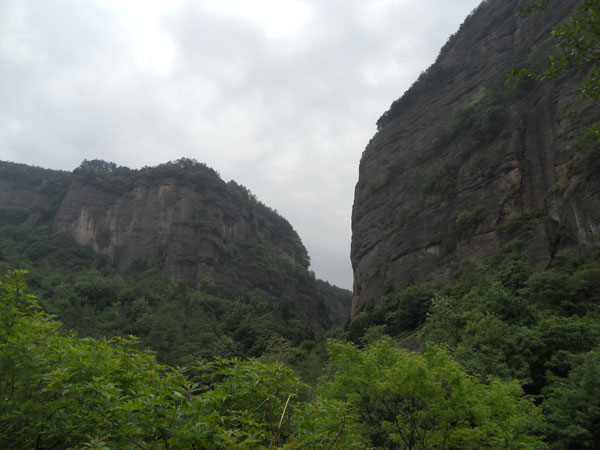 |
|
The Sword Gate Pass, a towering V-shaped mountain pass that gave rise to the household Chinese idiom, "One man at the pass keeps 10,000 men at bay." [Huang Zhiling/chinadaily.com.cn] |
Visitors to the city of Guangyuan, Sichuan province, are often told by proud locals that the ancient city is best known as the birthplace of Wu Zetian (AD 624-705), China's only ruling empress.
Wu was the fourth ruler of the Tang Dynasty (AD 618-907). During her reign from AD 683 to 705, Wu excelled at appointing capable people and China enjoyed peace and prosperity.
However, Guangyuan has abundant tourist resources, many of which precede even the empress.
The best-known site is the Sword Gate Pass, a towering V-shaped mountain pass, which gave rise to the household Chinese idiom, "One man at the pass keeps 10,000 men at bay."
As the pass was the only passageway to North China, almost every ambitious ruler who wanted to conquer Sichuan had to first take the pass. Since 316 BC, some 100 battles have been fought there. Because the pass is so steep, not a single frontal attack has been successful, according to Yang Mingguang, an information officer in the city.
"When the talk of smog is the order of the day in many cities, Guangyuan appeals to visitors because it is surrounded by rolling mountains and locals have never heard of smog," said Yu Jianhong, a native of the city.
Another grand sight, which makes Guangyuan attractive to visitors sensitive to air pollution, is the Green Cloud Corridor, a 150-km-long, stone-paved, cypress-shaded post road.
In ancient times, important letters of state were carried by horseback couriers along the post road.
As snow often covered the road in winter and the summer sun gave the couriers a scorching ride, local officials ordered cypresses planted on both sides of the road, to mark the road in winter and provide shade in summer.
The planting, begun in the Qin Dynasty (221-207 BC), lasted until the Ming Dynasty (1368-1644). By then, more than 100,000 cypresses had been planted. More than 8,000 ancient cypresses survive, said Yang Zhengguo, an information officer in Guangyuan.
Guangyuan is also known for a plank road along the Shu Path. Shu was the ancient name for Sichuan.
Construction of the Shu Path linking Sichuan and neighboring Shaanxi province started around 316 BC. It was built on mountains so precipitous that Li Bai (AD 701-762), one of China's best-known poets, wrote, "Traveling on the Shu Path is as difficult as ascending to heaven."
When builders of the path approached the Mingyue Gorge in Guangyuan, they found it impossible to continue the project as the cliffs were too steep. After much thought, they came up with a bold idea.
They chiseled three levels of holes in the cliffs, and inserted wooden beams into the holes. The upper beams were covered with planks to form a road for pedestrians and the second and third levels held buttresses.
During the Three Kingdoms period (AD 220-280), Zhuge Liang, prime minister of the Shu Kingdom, used the plank road to transport troops to fight rival troops in the Wei Kingdom in North China.
The plank road was burned down and rebuilt many times during wars. Now part of it has been restored to allow visitors to admire this manmade wonder.
"When I walked on the plank road built on dangerous cliffs beside the gushing Jialing River, I had awesome respect for those who built it," said Wu Dan, a young woman from Beijing who recently visited Guangyuan.
There are regular flights linking Beijing and Guangyuan, or it takes four hours to reach Guangyuan by bus from Chengdu, the capital of Sichuan.
